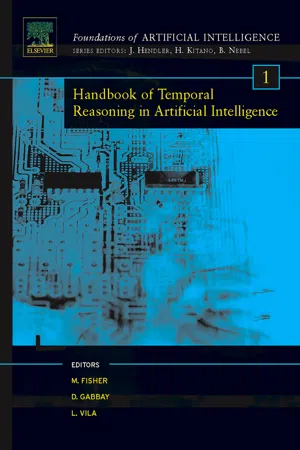
Handbook of Temporal Reasoning in Artificial Intelligence
- 750 pages
- English
- ePUB (mobile friendly)
- Available on iOS & Android
Handbook of Temporal Reasoning in Artificial Intelligence
About this book
This collection represents the primary reference work for researchers and students in the area of Temporal Reasoning in Artificial Intelligence. Temporal reasoning has a vital role to play in many areas, particularly Artificial Intelligence. Yet, until now, there has been no single volume collecting together the breadth of work in this area. This collection brings together the leading researchers in a range of relevant areas and provides an coherent description of the breadth of activity concerning temporal reasoning in the filed of Artificial Intelligence.Key Features: - Broad range: foundations; techniques and applications- Leading researchers around the world have written the chapters- Covers many vital applications- Source book for Artificial Intelligence, temporal reasoning- Approaches provide foundation for many future software systems· Broad range: foundations; techniques and applications· Leading researchers around the world have written the chapters· Covers many vital applications· Source book for Artificial Intelligence, temporal reasoning· Approaches provide foundation for many future software systems
Frequently asked questions
- Essential is ideal for learners and professionals who enjoy exploring a wide range of subjects. Access the Essential Library with 800,000+ trusted titles and best-sellers across business, personal growth, and the humanities. Includes unlimited reading time and Standard Read Aloud voice.
- Complete: Perfect for advanced learners and researchers needing full, unrestricted access. Unlock 1.4M+ books across hundreds of subjects, including academic and specialized titles. The Complete Plan also includes advanced features like Premium Read Aloud and Research Assistant.
Please note we cannot support devices running on iOS 13 and Android 7 or earlier. Learn more about using the app.
Information
Formal Theories of Time and Temporal Incidence
1.1 Introduction
Table of contents
- Cover image
- Title page
- Title page
- Table of Contents
- Copyright
- Preface
- Contributors
- Chapter 1. Formal Theories of Time and Temporal Incidence
- Chapter 2. Eventualities
- Chapter 3. Time Granularity
- Chapter 4. Modal Varieties of Temporal Logic
- Chapter 5. Temporal Qualification in Artificial Intelligence
- Chapter 6. Computational Complexity of Temporal Constraint Problems
- Chapter 7. Indefinite Constraint Databases with Temporal Information: Representational Power and Computational Complexity
- Chapter 8. Processing Qualitative Temporal Constraints
- Chapter 9. Theorem-Proving for Discrete Temporal Logic
- Chapter 10. Probabilistic Temporal Reasoning
- Chapter 11. Temporal Reasoning with iff-Abduction
- Chapter 12. Temporal Description Logics
- Chapter 13. Logic Programming and Reasoning about Actions
- Chapter 14. Temporal Databases
- Chapter 15. Temporal Reasoning in Agent-Based Systems
- Chapter 16. Time in Planning
- Chapter 17. Time in Automated Legal Reasoning
- Chapter 18. Temporal Reasoning in Natural Language
- Chapter 19. Temporal Reasoning in Medicine
- Chapter 20. Time in Qualitative Simulation
- Bibliography
- Index